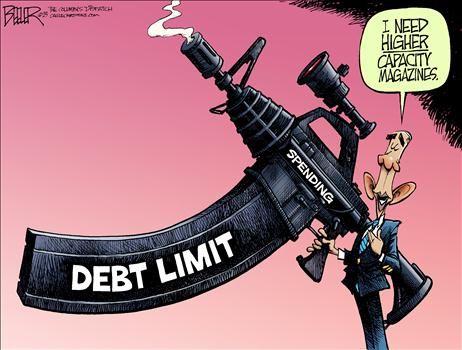
President
Obama, the Democrats, and plenty of Republicans in Congress, would like
it if you'd spend the next few weeks talking about gun control. That's
because when you are, you're not talking about the country's financial
situation.
And, as the graph included here,
taken from OMB budget data, illustrates, the situation is dire.
Spending keeps going up. Revenues, however, are not. And, since we're
borrowing the difference, President Obama has what Politico is calling a debt problem:
"The staggering national debt — up about 60% from the $10 trillion
Obama inherited when he took office in January 2009 — is the single
biggest blemish on Obama's record, even if the rapid descent into red
began under President George W. Bush. Obama has long emphasized Bush's
role in digging the immense hole. But he owns it now."
Well,
things did start to go south under Bush. But look at that graph more
closely. In 2003, when we invaded Iraq (one of those "two wars on the credit card"
that Obama likes to blame for the debt), and when we passed the Bush
tax cuts (the other thing Obama likes to blame for the debt) revenue
actually started to climb. The revenue and spending lines start to
converge, and, as they head up to 2006 it actually looks as if the two
might cross, with revenue outpacing spending.
Even the New York Times noticed, spotting unexpected increases in revenue in 2005, and in 2006 noting that a "surprising"
increase in tax revenues was closing the budget gap. The heady
possibility of surpluses was in the air. But -- look at the graph again
-- everything changes in 2007.
What happened in 2007? The
financial crisis hadn't struck yet. But we did elect a new Democratic
Congress, with Democrats controlling both houses for the first time in
over a decade. The trend immediately reversed, and became much worse
with President Obama's election in 2008 and inauguration in 2009. (In
fact, despite talk of "wars on the credit card," we could save a lot of
money by cutting defense spending back to where it was in 2007.)
So
does that mean that the ballooning debt is all Obama's fault? No.
Most of those spending bills got Republican votes, too. But it does
mean that, as Politico notes, Obama now owns the 60% increase in
the debt that has occurred on his watch, and can no longer credibly
blame Bush (under whom plenty of Democrats voted for spending bills).
Economist
Herbert Stein observed that something that can't go on forever, won't.
The United States can't go on forever increasing its debt by 60% every
four years. Therefore, it won't. The only question is how things will
stop -- smoothly or catastrophically.
As we head into the next
debt-ceiling debate, it's worth considering these words from a patriotic
senator concerned with America's future:
"The fact that we are
here today to debate raising America's debt limit is a sign of
leadership failure. . . . It is a sign that the U.S. government can't
pay its own bills. It is a sign that we now depend on ongoing financial
assistance from foreign countries to finance our government's reckless
fiscal policies. … Leadership means that 'the buck stops here.' Instead,
Washington is shifting the burden of bad choices today onto the backs
of our children and grandchildren. America has a debt and a failure of
leadership. Americans deserve better. I therefore intend to oppose the
effort to increase America's debt limit."
The senator? Sen. Barack Obama, in 2006.
I wish that guy was President now.
Glenn Harlan Reynolds is a professor of law at the University of Tennessee. He blogs at InstaPundit.com.
No comments:
Post a Comment